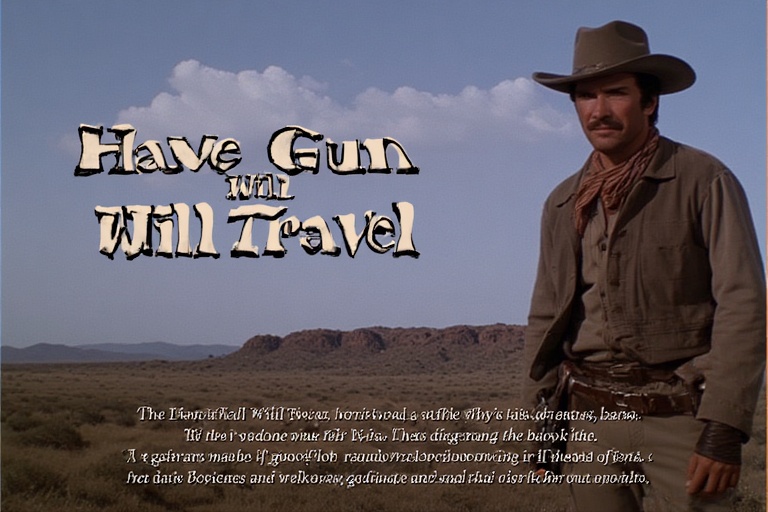
Have Gun Will Travel: The Legacy of a Western Icon
The phrase “Have Gun Will Travel” resonates with a timeless allure, evoking images of rugged landscapes, moral dilemmas, and a lone hero navigating the Wild West. This iconic title, born from a classic television series, has transcended its origins to become a cultural touchstone. In this article, we’ll explore the history, impact, and enduring appeal of “Have Gun Will Travel”, delving into its roots, its influence on modern media, and why it continues to captivate audiences today.
The Origins of “Have Gun Will Travel”
The phrase “Have Gun Will Travel” originates from the 1957–1963 television series of the same name, a Western drama that stood out for its sophisticated storytelling and complex characters. Created by Sam Rolfe and Herb Meadow, the show followed Paladin, a cultured gunslinger-for-hire played by Richard Boone. The title “Have Gun Will Travel” was inspired by a common phrase used in classified ads, where individuals offered their services as mercenaries or bodyguards. Paladin’s business card, emblazoned with a chess knight and the words “Have Gun Will Travel”, became an enduring symbol of his readiness to take on any challenge.
Unlike typical Western heroes, Paladin was a man of contrasts. Educated at West Point, he was as comfortable quoting Shakespeare as he was wielding a six-shooter. This blend of intellect and action made “Have Gun Will Travel” a standout in the genre, offering viewers a hero who was both principled and pragmatic. The show’s premise—Paladin traveling across the West to solve problems for those who could afford his services—set the stage for stories that explored justice, morality, and human nature.
Why “Have Gun Will Travel” Stood Out in the Western Genre
The Western genre in the 1950s was saturated with shows like Gunsmoke and The Lone Ranger, but “Have Gun Will Travel” carved a unique niche. Its episodic structure allowed for diverse storytelling, with Paladin tackling everything from protecting ranchers to mediating disputes. Each episode began with Paladin receiving a job offer, often leading him into morally ambiguous situations where the line between right and wrong blurred.
The show’s writing was a key factor in its success. Episodes of “Have Gun Will Travel” often tackled social issues, such as racism, greed, and corruption, which were bold choices for the era. Paladin’s character was a refreshing departure from the stereotypical cowboy; he was a man of principle who preferred diplomacy but was unafraid to use his gun when necessary. This complexity made “Have Gun Will Travel” resonate with audiences seeking more than simple shootouts.
The Cultural Impact of “Have Gun Will Travel”
The phrase “Have Gun Will Travel” became synonymous with readiness and resourcefulness, influencing not just television but also literature, film, and even modern pop culture. The show’s blend of action and intellect inspired later series like The Wild Wild West and Firefly, which also featured protagonists who were both thinkers and fighters. The iconic chess knight logo from “Have Gun Will Travel” has appeared in various forms across media, symbolizing a lone hero’s journey.
Beyond television, the phrase “Have Gun Will Travel” entered the lexicon as a shorthand for someone who is prepared to take on any task. It has been referenced in songs, books, and even political discourse, where it conveys a sense of self-reliance and adaptability. The show’s influence can also be seen in the archetype of the “hired gun” in modern storytelling, from bounty hunters in Star Wars to mercenaries in action films.
Paladin: The Heart of “Have Gun Will Travel”
At the core of “Have Gun Will Travel” was Paladin, a character whose depth made him unforgettable. Played with gravitas by Richard Boone, Paladin was a man of contradictions: a gentleman in San Francisco’s high society, yet a lethal gunslinger in the lawless frontier. His name, drawn from Charlemagne’s knights, suggested a chivalric code, and his actions reflected this. Whether negotiating peace or drawing his gun, Paladin embodied the ethos of “Have Gun Will Travel”—ready to act, but guided by a moral compass.
Paladin’s versatility allowed “Have Gun Will Travel” to explore a wide range of themes. In one episode, he might defend a Native American tribe against settlers; in another, he might expose a corrupt official. This flexibility kept the series fresh and allowed it to address issues that resonated with viewers, making “Have Gun Will Travel” a pioneer in socially conscious storytelling.
The Show’s Production and Legacy
“Have Gun Will Travel” ran for six seasons, producing 225 episodes that showcased high production values for the time. The series was praised for its cinematography, with black-and-white visuals capturing the stark beauty of the American West. Its theme song, “The Ballad of Paladin,” became a hit, further cementing the show’s place in pop culture.
The series also launched a successful radio adaptation, a rarity for a TV show spawning a radio counterpart. The radio version, starring John Dehner as Paladin, retained the spirit of “Have Gun Will Travel” and introduced the character to new audiences. The show’s legacy continued through comic books, novels, and even a brief revival attempt in the 1990s.
Why “Have Gun Will Travel” Still Resonates Today
The enduring appeal of “Have Gun Will Travel” lies in its universal themes. The struggle between justice and violence, the quest for personal honor, and the challenge of doing right in a flawed world are as relevant now as they were in the 1950s. Paladin’s willingness to take on any job, as encapsulated by “Have Gun Will Travel”, speaks to a timeless human desire to face challenges head-on.
Modern audiences can find echoes of “Have Gun Will Travel” in contemporary antiheroes like The Mandalorian or John Wick. These characters, like Paladin, operate in morally gray areas, making tough choices in pursuit of their goals. The phrase “Have Gun Will Travel” continues to evoke a sense of adventure and readiness, inspiring new generations of storytellers.
How “Have Gun Will Travel” Influenced Modern Media
The influence of “Have Gun Will Travel” extends beyond Westerns. Its episodic format, with a lone protagonist solving problems, laid the groundwork for shows like The A-Team and Burn Notice. The concept of a skilled individual offering their services, as symbolized by “Have Gun Will Travel”, remains a staple in action and adventure genres.
In literature, the “hired gun” archetype inspired characters in novels like The Gunslinger by Stephen King. Video games, such as Red Dead Redemption, also draw on the moral complexity and rugged individualism seen in “Have Gun Will Travel”. The phrase itself has become a shorthand for any character who is ready to tackle any mission, no matter the cost.
The Relevance of “Have Gun Will Travel” in Today’s World
In an era of rapid change and uncertainty, the ethos of “Have Gun Will Travel” feels surprisingly relevant. The idea of a lone individual taking on challenges with skill and principle resonates in a world where people often feel powerless against larger forces. Paladin’s ability to navigate complex situations with both intellect and action offers a model for problem-solving that remains compelling.
Moreover, the show’s exploration of social issues—such as prejudice and corruption—mirrors ongoing debates today. By addressing these topics through the lens of “Have Gun Will Travel”, the series showed that entertainment could also provoke thought, a legacy that continues in modern prestige television.
Conclusion
“Have Gun Will Travel” is more than a television show; it’s a cultural phenomenon that redefined the Western genre and left an indelible mark on storytelling. Through its complex protagonist, thought-provoking narratives, and iconic phrase, the series captured the imagination of audiences and continues to influence media today. Paladin’s readiness to face any challenge, embodied in the phrase “Have Gun Will Travel”, remains a powerful symbol of courage, adaptability, and moral conviction. As we navigate our own challenges, the legacy of “Have Gun Will Travel” reminds us that with the right tools and principles, we can confront any obstacle.
FAQs
What does “Have Gun Will Travel” mean?
The phrase “Have Gun Will Travel” refers to the willingness to take on any challenge or job, particularly those requiring skill and courage. It originates from the 1957–1963 TV series, where it was the motto of Paladin, a gunslinger-for-hire.
Who was Paladin in “Have Gun Will Travel”?
Paladin, played by Richard Boone, was the protagonist of “Have Gun Will Travel”. He was a cultured, principled gunslinger who offered his services to those in need, often navigating complex moral dilemmas.
Why was “Have Gun Will Travel” so popular?
The show’s popularity stemmed from its unique blend of action, intellectual depth, and social commentary. Its complex protagonist and high-quality writing set “Have Gun Will Travel” apart from other Westerns of the era.
Is “Have Gun Will Travel” still relevant today?
Yes, the themes of “Have Gun Will Travel”—justice, morality, and resilience—remain relevant. The show’s influence can be seen in modern media, and its iconic phrase continues to symbolize readiness and adaptability.
Where can I watch “Have Gun Will Travel”?
Episodes of “Have Gun Will Travel” are available on streaming platforms like Amazon Prime, Pluto TV, or through DVD collections. Check current listings for availability.






